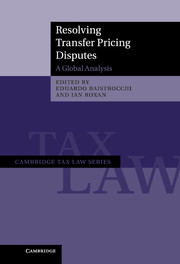Book contents
- Frontmatter
- Contents
- List of figures
- List of tables
- List of contributors
- Acknowledgements
- The Golden Bridge: analytical table of cases by topics in the OECD Guidelines
- Table of Cases
- Abbreviations
- Part I The context of transfer pricing disputes
- Part II North America and Europe
- Part III Asia Pacific
- 9 Transfer pricing disputes in Australia
- 10 Transfer pricing disputes in Japan
- 11 Transfer pricing disputes in the Republic of Korea
- 12 Transfer pricing disputes in Singapore
- Part IV BRIC Countries
- Part V South America, Middle East and Africa
- Part VI Conclusion
- Index
- References
11 - Transfer pricing disputes in the Republic of Korea
from Part III - Asia Pacific
Published online by Cambridge University Press: 05 November 2014
- Frontmatter
- Contents
- List of figures
- List of tables
- List of contributors
- Acknowledgements
- The Golden Bridge: analytical table of cases by topics in the OECD Guidelines
- Table of Cases
- Abbreviations
- Part I The context of transfer pricing disputes
- Part II North America and Europe
- Part III Asia Pacific
- 9 Transfer pricing disputes in Australia
- 10 Transfer pricing disputes in Japan
- 11 Transfer pricing disputes in the Republic of Korea
- 12 Transfer pricing disputes in Singapore
- Part IV BRIC Countries
- Part V South America, Middle East and Africa
- Part VI Conclusion
- Index
- References
Summary
Introduction
The Republic of Korea has adopted the civil law system. Korea became a member of the OECD in 1996, but even before then, it had been under the influence of the OECD Model Tax Convention and various reports on transfer pricing in the international tax arena.
The Convention between the Republic of Korea and Japan for the Avoidance of Double Taxation and the Prevention of Fiscal Evasion with respect to Taxes on Income (‘Korea–Japan Tax Treaty’), entered into force in March 1970, is the first bilateral tax treaty for Korea, which was influenced by the 1963 draft of the OECD Model Tax Convention. The origin of the Korea–Japan Tax Treaty was the result of the efforts made by both countries since 1964 to solve the problems which had arisen where Japanese trading companies had been imposing high estimated taxes when providing goods to the Korean Public Procurement Service. Since the conclusion of the Korea–Japan Tax Treaty, Korea has successively signed tax treaties with other countries and, as of 15 July 2011, seventy-seven tax treaties are in force.
- Type
- Chapter
- Information
- Resolving Transfer Pricing DisputesA Global Analysis, pp. 439 - 488Publisher: Cambridge University PressPrint publication year: 2012



